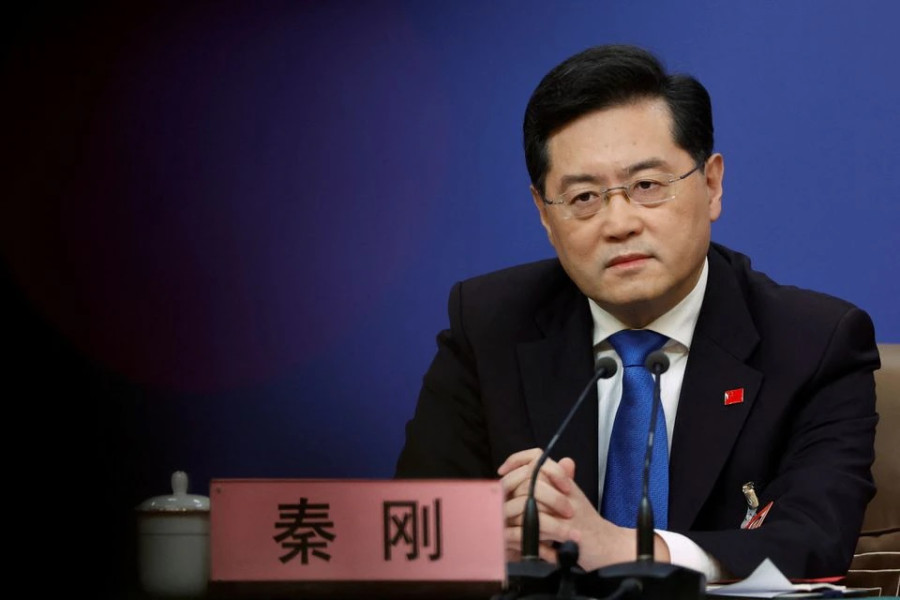Columns
New journey of China’s diplomacy
Conflict, sanctions and pressure will not solve the problem. What is needed is calmness, reason and dialogue.
Chen Song
On March 7, 2023, a press conference was held on the margins of the First Session of the 14th National People’s Congress, during which State Councilor and Foreign Minister Qin Gang answered questions from Chinese and foreign media and comprehensively, explicitly interpreted China’s foreign policy and external relations. I believe it would be pertinent to discuss certain issues he raised.
The year 2023 is the first year of fully implementing the guiding principles set forth by the 20th National Congress of the Communist Party of China. The Congress outlined top-level plans for China’s diplomacy, identified our missions and tasks, and made strategic arrangements to that end.
China will follow the guidance of head-of-state diplomacy. In particular, we will ensure the success of the two major diplomatic events that we will host—the first China-Central Asia Summit and the third Belt and Road Forum for International Cooperation.
China will take it as a mission to defend its core interests. We firmly oppose any form of hegemonism and power politics. We firmly oppose the Cold War mentality, camp-based confrontation, and acts to contain and hold back other countries’ development. We will resolutely safeguard China’s sovereignty, security and development interests. China will build on our extensive partnerships. We will pursue coordination and sound interactions among major countries, seek friendship and cooperation with other countries, and promote a new type of international relations.
China will take openness and development as our objective. We will reject “decoupling”, and oppose severing industrial and supply chains and imposing unilateral sanctions. We will generate new opportunities for the world with our new development. China will take multilateralism as the way forward. We will promote the building of a community with a shared future for mankind and promote greater democracy in international relations. We will offer more, better Chinese insight and solutions to help meet humanity’s common challenges.
“Chinese modernisation” has become a popular phrase in the world. It offers solutions to many challenges facing human development. It busts the myth that modernisation is westernisation; it creates a new form of human advancement; and it provides an important source of inspiration for the world, especially developing countries. Chinese modernisation has at least five features:
First, independence. The Chinese path to modernisation is exactly developed in China and rooted in Chinese culture and fits in well with China’s national conditions. China’s success in development also proves that every country has the right and ability to choose its own path, and to hold its future firmly in its own hands.
Second, putting people first. Chinese modernisation is the modernisation of common prosperity for all. It is about achieving both material abundance and cultural-ethical enrichment for the people. Modernisation should not serve the interests of only a few countries or individuals. People around the world should all enjoy the rights to seek development as equals and pursue happiness.
Third, peaceful development. Chinese modernisation is not pursued through war, colonisation, or plundering. It is dedicated to peace, development, cooperation and mutual benefit, and is committed to harmony between humanity and nature. It is a new path different from Western modernisation.
Fourth, openness and inclusiveness. Humanity’s modernisation should not be a one-flower show but a hundred flowers in bloom. It is important to respect the right of every country to pursue a modernisation path tailored to its national reality, and encourage exchange and mutual learning, so that all will flourish and prosper together.
Fifth, working hard in unity. China’s success proves that acting in disunity like a heap of loose sand will get us nowhere, and that only by striving in unity can we pool strength. We will persevere in carrying out the set blueprint until it becomes reality.
Amid the changes and confusion, people are wondering what’s wrong with our world and what we should do about it. Through the past 10 years in the new era, President Xi Jinping has put forward a host of major initiatives and proposals, including building a community with a shared future for mankind, the Belt and Road Initiative, the common values of humanity, the Global Development Initiative (GDI) and the Global Security Initiative (GSI). The core message of these initiatives is that countries are interdependent, mankind has a shared future, and the international community must get united for cooperation.
Yet the path to global governance is far from smooth. Global governance should be promoted in accordance with the law and the principles of international law enshrined in the UN Charter; equity and justice must be upheld while hegemonism and selfish interests must be rejected; solidarity must be defended while division and confrontation must be abandoned.
Developing countries account for more than 80 percent of the global population and more than 70 percent of global economic growth. People in developing countries are entitled to a better life, and developing countries are entitled to greater representation and a louder voice in international affairs.
On the China-US relationship, a recent episode in bilateral relations is the unmanned airship incident. It is entirely an accident caused by force majeure, and its facts and nature are crystal clear. Even the United States did not believe it posed a physical threat. However, in violation of the spirit of international law and international customary practices, the US acted with a presumption of guilt. It overreacted, abused force, and dramatised the accident, creating a diplomatic crisis that could have been avoided. In this case, the US perception and views of China are seriously distorted. It regards China as its primary rival and biggest geopolitical challenge.
As President Xi pointed out, whether China and the US can handle their relationship well bears on the future of the world. Getting the relationship right is not optional, but something we must do and must do well. China will continue to follow the principles put forth by President Xi, namely, mutual respect, peaceful coexistence and win-win cooperation, to pursue a sound and stable relationship with the US.
We hope the US government will listen to the calls of the two peoples, rid of its strategic anxiety of “threat inflation”, abandon the zero-sum Cold War mentality, and refuse to be hijacked by “political correctness”. We hope that the United States will honour its commitments and work with China to explore the right way to get along with each other to the benefit of both countries and the entire world.
Coming to the Ukraine crisis, it has a complex history and reasons. In essence, it is an eruption of the problems built up in the security governance of Europe. China always makes its own judgment independently based on the merits of the issue. Between peace and war, we choose peace. Between dialogue and sanctions, we choose dialogue. Between lowering the temperature and fanning the flames, we choose the former. China did not create the crisis. It is not a party to the crisis, and has not provided weapons to either side of the conflict. Why on earth the blame, sanctions and threats against China? This is absolutely unacceptable.
Less than two weeks ago, China issued China’s Position on the Political Settlement of the Ukraine Crisis. It offers 12 propositions, including respecting the sovereignty of all countries, abandoning the Cold War mentality, ceasing hostilities, and resuming peace talks. The core stance is to promote talks for peace. The Ukraine crisis has come to a critical juncture. Either hostilities stop and peace is restored and the process of political settlement begins, or more fuel is added to the flames and the crisis further expands and spirals out of control.
Conflict, sanctions and pressure will not solve the problem. What is needed is calmness, reason and dialogue. The process of peace talks should begin as soon as possible, and the legitimate security concerns of all parties should be respected. This is the right way to achieve durable security in Europe.




 11.71°C Kathmandu
11.71°C Kathmandu















